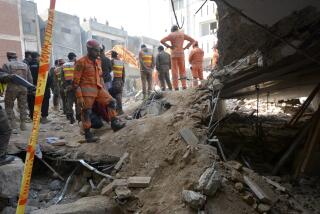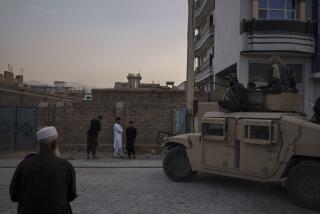Violence Won’t Deter Pakistan Visit, Bush Says
- Share via
NEW DELHI — President Bush said Thursday that he had no intention of canceling his long-planned visit to Pakistan, despite a suicide bombing that killed a U.S. consular officer in Karachi and intense gun battles between the military and pro-Taliban forces near the Afghan border.
After his expected arrival today, Bush is to spend Saturday in talks with President Pervez Musharraf, considered a key ally in the U.S.-declared war on terrorism.
Bush administration officials said security provided by the military and the Secret Service would be intense, but they acknowledged that the journey bore some risk.
“Pakistan is both an ally in the war on terror and, in some sense, a site where the war” is being carried out, said Stephen Hadley, Bush’s national security advisor. “At this point, people are comfortable that the necessary precautions are in place. But this is not a risk-free undertaking.”
The president, Hadley said, was visiting Pakistan to express “solidarity” with that nation’s fight against terrorism. Bush is not expected to visit Karachi, Pakistan’s largest city.
Unlike his unannounced visit Wednesday to war-torn Afghanistan en route to a summit in India, Bush and his aides have been openly discussing the president’s plans for Pakistan -- including his intention to attend a cricket match.
When President Clinton visited in 2000, officials were so concerned about security that they flew him in aboard an unmarked military jet, with the rest of his entourage on Air Force One.
Also unlike the Afghanistan trip, which involved a scaled-down complement of staff and reporters aboard Air Force One, Bush will arrive in Pakistan with a more typical entourage -- a cast of hundreds that includes security agents, White House staff, and reporters and crews representing newspapers, magazines, wire services and television networks from around the world.
“Terrorists and killers are not going to prevent me from going to Pakistan,” Bush said.
The rising violence in Pakistan underscored the challenges facing the president as he attempts to keep Musharraf as an ally in the war on terrorism.
On Wednesday, the Pakistani military struck at what it said was a militant camp in the northwestern tribal area of Waziristan, killing as many as 40 people. The army said many of them, including a Chechen identified as a leader, were foreigners believed to be carrying out attacks in Afghanistan. Residents, however, have said all the dead were villagers, and accused Musharraf of staging the attack as a show for his U.S. visitors.
Musharraf on Thursday expressed condolences for the death of U.S. consular officer David Foy and three others in an explosion earlier in the day near the U.S. Consulate in the city of Karachi. No one claimed responsibility for the blast, which also injured at least 50 people.
Hadley said there was evidence that Foy had been the intended target. Authorities in Karachi said they believed a suicide bomber rammed his car into Foy’s vehicle.
“This senseless act will not deter our strong resolve to pursue the relentless fight against the evil of terrorism,” Musharraf said. “We all must continue to work together to eliminate this threat.”
A general who came to power in a bloodless coup in 1999, Musharraf is under pressure at home to stop cooperating with the U.S. in efforts to root out Al Qaeda and Taliban militants hiding in the mountainous tribal areas of Pakistan.
During his visit to Afghanistan, Bush reiterated his prediction that Al Qaeda leader Osama bin Laden and former Taliban ruler Mullah Mohammed Omar, who are believed to be hiding in Pakistan, would eventually be captured.
“It’s important to talk with President Musharraf about continuing our fight against terrorists,” Bush said. “After all, he has had a direct stake in this fight -- four times the terrorists have tried to kill him.”
Times special correspondent Mubashir Zaidi in Islamabad, Pakistan, contributed to this report.
More to Read
Sign up for Essential California
The most important California stories and recommendations in your inbox every morning.
You may occasionally receive promotional content from the Los Angeles Times.













